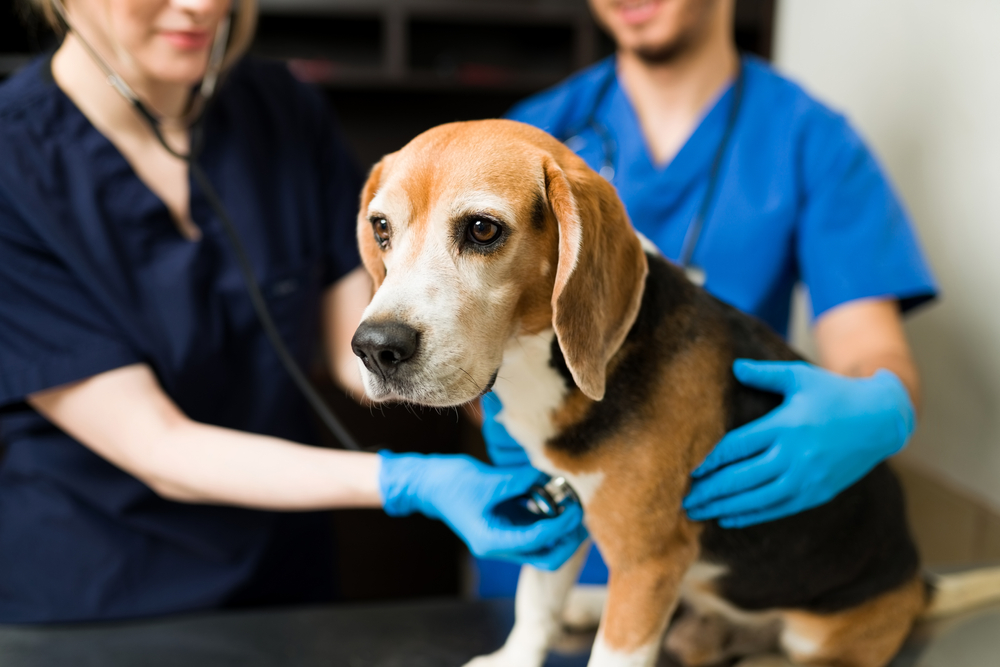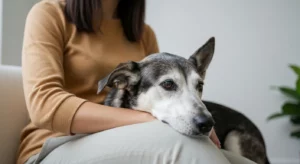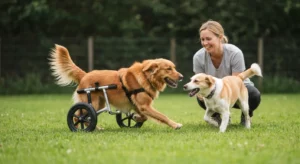Gastritis in dogs: crucial things to know as a dog owner!
Like humans, dogs can get gastritis, but because they can’t tell us what hurts, it’s much more complicated to figure out what is wrong with them. Fortunately, based on a couple of frequent symptoms, you can determine if it’s time to pay a visit to your vet, who will run some tests to determine the root cause.
Sometimes gastritis is acute, which means it starts suddenly and recently. For example, it could be brought on by consuming toxic materials. In other cases, chronic gastritis indicates a more serious underlying cause.
Before we begin, let’s establish what gastritis is for those who may not know: it is the damage to the stomach and its lining, typically accompanied by periods of vomiting and no desire to eat. Similar to humans, gastritis in dogs can result in infection and ulcers if left untreated.
For dogs, gastritis symptoms are typically easily recognized and extremely uncomfortable. Severe vomiting is the most obvious symptom of gastritis. Go to the veterinarian right away if your dog exhibits one or two of the following symptoms.

Frequent vomiting
Vomiting is the main sign of gastritis in dogs; however, the frequency and intensity of the vomiting may differ from one animal to another. A mild case of stomach upset may not look like vomiting caused by gastritis. Gastritis-related vomiting can be frothy, black, bloody, or contain bile. A snack or foreign object may also show up in the vomit if your dog’s gastritis is caused by eating something irritating.
We mentioned that vomiting may differ from one dog to another, and some dogs don’t vomit right away. They suffer from nausea, which is pretty common too, and it can manifest as excessive salivation or clenching of the teeth.
Keep in mind that if the vomiting persists longer than 24 hours, your dog might also be dehydrated so it’s better to call your vet right away!
Diarrhea
Another symptom that indicates your dog is suffering from gastritis is diarrhea. Gastritis may cause your dog to pass blood in its stool, which, combined with poop, may turn black. Pay attention to your dog immediately if it is not feeling well, is not eating as much as it used to, but somehow is pooping frequently. See a veterinarian right away if you discover blood in your dog’s stool, as this could indicate hemorrhagic diarrhea syndrome in addition to gastritis.
Abdominal pain
You can’t ask your dog if they have a stomach ache, but if they have chattering teeth, excess salivation, and excessively licking the lips and other surfaces, those are signs there is clearly something wrong with them.
Additionally, diarrhea and vomiting are frequent symptoms of an irritated, inflamed stomach and intestines, which causes abdominal pain. You might notice if your dog’s stomach feels a bit more tender than usual. This tenderness can be a helpful sign that something might be off.
Low appetite
Is your dog a foodie, and the kibble disappears in less than 5 minutes from the bowl, but in the past days its appetite decreased? It might be gastritis. This symptom may quickly lead to weight loss, stomach pain, vomiting, and, because of the latter, dehydration. If, by any chance, you suspect that this is because of food, maybe you switched to something different recently, and your pooch doesn’t like it. You can also try switching it again to the old one and see if there are any changes.
How is gastritis developed?
It is not uncommon for dogs to suffer from acute gastritis. In most cases this disease develops when the dog eats something that it shouldn’t; either food or a chewable toy. Inflammation and gastritis can also result from giving your dog too much of its normal food, even if they aren’t consuming any dangerous foods.
Additionally, you might find that your dog has an allergy to a food ingredient found in the kibble that can repeatedly cause inflammation and result in chronic gastritis. That’s why it is recommended that before changing the regular dry or wet food with a brand new one, you ask your vet. It wouldn’t hurt to have a series of blood tests done because you never know what they might find or what foods the dog is allergic to. Sometimes allergies develop over the years when the dogs get old.
On the other hand, gastritis can also be caused by liver disease, pancreatitis, or bacteria.

How is gastritis in dogs diagnosed?
Based on the symptoms your dog has, your veterinarian will then determine if your dog has gastritis or other disease. You will start by explaining if you saw your dog eat mulch or swallow a sock, which might have caused the vomiting, abdominal aches, or loss of appetite.
Based on any preliminary information provided, your veterinarian will perform the necessary x-rays, blood work, urinalysis, and stool sampling. It might be necessary to conduct a diet trial with the gradual elimination of ingredients if your veterinarian believes that something in your dog’s usual diet is triggering an allergic reaction that results in gastritis.
Treatment for gastritis primarily depends on its cause, but either acute or chronic vomiting is typically sufficient to diagnose the condition. A more comprehensive diagnostic approach, including surgical gastric biopsies, will be necessary for chronic gastritis.
Now we will get through some frequently asked questions regarding this particular disease:
Will my dog recover fast from gastritis?
The answer is yes. Most of the time, when your dog gets the right treatment, you’ll start noticing positive changes in his behavior in just two or three days! However, depending on the type of gastritis, it might be necessary to be hospitalized for a few days to be kept under the vet’s supervision. But one thing is for sure: for this particular disease, the treatment is pricey, especially if it’s not diagnosed immediately.
Depending on the breed, some dogs might need continued care even after their symptoms have been taken care of.
Can I keep my dog away from developing gastritis?
Making every effort to make sure your dog isn’t consuming anything toxic is the only way to avoid acute gastritis. Even with correct care, dogs can still develop gastritis, and pinpointing the exact cause is impossible. Keep toxic foods well out of dogs’ reach and avoid buying houseplants that could harm them.
If vomiting stops, then it’s not gastritis?
Your dog probably doesn’t have gastritis if it throws up once or twice and then stops a few days later. See your veterinarian to rule out gastritis; however, if your dog has been throwing up for seven to fourteen days.
Is there a strict diet in case my dog has gastritis?
Your vet may suggest a diet once your dog stops throwing up. Foods like rice, pumpkin, and sweet potatoes can help support digestion and neutralize gastritis. To stop additional irritation, it’s important to avoid feeding your dog processed, fatty, and spicy foods.
We really hope this article was useful and informational, and in case you have to go through this with your dog, you will know what to do to help it. Until next time!
Are you living in an apartment but you desire to adopt a dog? This article is for you: 9 Docile Dog Breeds That Thrive Indoors.












